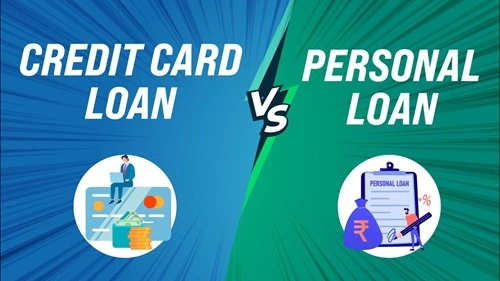In today’s fast-paced life, the need for instant money can arise at any time—be it for a medical emergency, wedding expenses, home renovation, travel, or any other personal requirement. When immediate funds are needed, two of the most accessible options are Personal Loans and Credit Card Loans.
Both of these are unsecured forms of credit, meaning you don’t need to pledge any collateral. However, they differ in terms of interest rates, repayment flexibility, eligibility, and best-use scenarios. Choosing the right one can help you manage your finances better and save money in the long run.
Let’s understand both these credit options in detail and compare them to find out what’s better for you.
What is a Personal Loan?

A personal loan is an unsecured loan provided by banks, NBFCs (Non-Banking Financial Companies), or digital lenders to eligible individuals. It can be used for a variety of personal needs without having to declare the purpose. The loan amount, tenure, and interest rate depend on your credit score, income, and repayment capacity.
Key Features:
- Loan amount: ₹50,000 to ₹40 lakhs (depends on lender)
- Tenure: 12 to 60 months
- Interest rates: 10% to 24% p.a.
- Fixed monthly EMIs
- No collateral required
What is a Credit Card Loan?
A credit card loan can either be:
- A loan on your credit card limit (pre-approved based on your usage),
- Or a conversion of your outstanding balance into EMIs.
These loans are usually offered to existing credit card users who have a good payment history and creditworthiness.
Key Features:
- Loan amount: Up to available credit limit or sometimes over it (pre-approved)
- Tenure: 3 to 48 months
- Interest rates: 13% to 24% p.a.
- Instant approval (if eligible)
- Quick disbursal to card or savings account
Personal Loan vs Credit Card Loan: Key Differences
Here is a side-by-side comparison of the two options:
| Feature | Personal Loan | Credit Card Loan |
| Approval Time | 24–48 hours (faster with pre-approved) | Instantly (if pre-approved) |
| Interest Rate | 10% – 24% p.a. | 13% – 24% p.a. |
| Loan Amount | ₹50,000 – ₹40 lakhs | Based on credit limit (usually lower) |
| Tenure | 1 – 5 years | 3 – 48 months |
| Documentation | KYC, salary slips, bank statement | Minimal (existing customers) |
| Processing Fee | 1% – 2.5% of loan amount | 0 – 3% (varies by bank and card) |
| Prepayment Charges | 0% – 5% | Usually higher or not allowed |
| Repayment Mode | Fixed monthly EMIs via bank account | EMIs debited from credit card/bank account |
| Best For | Large planned expenses or long-term need | Short-term needs or urgent small expenses |
When Should You Choose a Personal Loan?
Opt for a personal loan if:
- You need a large amount of money (e.g., ₹2 lakhs or more).
- You want longer repayment tenure (up to 5 years).
- Your credit card limit is not sufficient.
- You need predictable EMIs and better budget planning.
- You are planning debt consolidation (combine other high-interest debts).
For example, if you are planning a wedding and need ₹5 lakhs, a personal loan with a tenure of 3–5 years will make your EMIs manageable.
When Should You Choose a Credit Card Loan?
Choose a credit card loan if:
- You already have a credit card with a good limit.
- You need money instantly without much paperwork.
- You want to convert a large purchase into EMIs.
- You have an emergency expense like a medical bill.
- You’re confident about repaying within a short period.
For instance, if you’ve just made a ₹50,000 electronics purchase using your credit card, you can convert it into 6- or 12-month EMIs with minimal interest.
Pros and Cons
Personal Loan Pros:
- Higher loan amounts
- Longer tenure options
- Can be used for any purpose
- Better suited for salaried and self-employed individuals
Personal Loan Cons:
- Takes time to process if not pre-approved
- Requires documentation
- May attract prepayment penalty
Credit Card Loan Pros:
- Instant disbursal if pre-approved
- Minimal paperwork
- Convenient for existing cardholders
- Flexible repayment options
Credit Card Loan Cons:
- Limited to your card’s credit limit
- High interest if repayment is delayed
- Loan may not be available to new users or those with low usage
Which is Better? Personal Loan or Credit Card Loan?
There’s no one-size-fits-all answer. It depends on your requirement, urgency, and financial situation.
- Go for a personal loan if you’re planning a long-term financial goal, like home renovation or medical treatment, and want a structured EMI plan.
- Go for a credit card loan if you have a short-term cash crunch, and the amount required is within your card’s limit.
Expert Tip: How to Decide?
Ask yourself these questions:
- How much money do I need?
- Can I repay the loan in less than a year?
- Is the credit card loan interest-free or at low promotional rates?
- Is my credit score strong enough for a personal loan at low interest?
If you’re eligible for both, compare the total cost of borrowing (interest + processing fees) and choose the cheaper option.
Conclusion
In the end, both personal loans and credit card loans are helpful financial tools if used wisely. Personal loans are better for planned big expenses with longer repayment tenures, while credit card loans are ideal for quick funds for smaller or emergency needs.
However, avoid falling into a debt trap by borrowing more than you can repay. Always assess your financial situation, compare offers from different lenders, and read the terms and conditions carefully before making a decision.
FAQs
1. Is a credit card loan cheaper than a personal loan?
Not always. Some promotional credit card loans may offer lower interest initially, but personal loans generally offer better terms for higher loan amounts.
2. Can I foreclose a personal loan or credit card loan?
Yes, but charges may apply. Personal loans may have foreclosure charges (0% to 5%), and credit card loans may not allow foreclosure early.
3. Does taking a loan affect my credit score?
Yes. Timely repayment improves your score, while defaults hurt it. Both personal and credit card loans are reported to credit bureaus.
4. Can a self-employed person get a personal loan?
Yes. Many lenders offer personal loans to self-employed individuals based on their income, ITR filings, and credit score.


